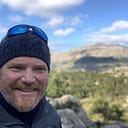Life sustains life through regenerative communities (Part 3 of 3)
Conversation between Fritjof Capra and Daniel Wahl, Feb. 2020
NOTE: below are just the questions I asked Fritjof in this third part of our conversation. I have not had the time to produce a transcript but this conversation is the richest part of all three. I hope to produce transcripts of all the interviews in this series once I gain more patrons to support this work:
Daniel: There is a growing number of people around the world who are moving beyond the state of alarm caused by the converging crises we have now seen deepening for over 50 years. I call them the reGeneration Rising. People — young and old — wanting to take an active part in restoring ecosystems health and improving planetary health. The last part of your and Pier Luigi Luisi’s book is called ‘Sustaining the Web of Life’:
Which key lessons of ecology would you recommend they need to pay special attention to? How do we sustain and regenerate the web of Life?
Fritjof Capra: …[Note: I decided to post this without a partial transcript of Fritjof’s replies, as I will not have time to do the transcripts for a while as I have to prioritise family and other work … you can listen to the answers in the youtube recording linked below.]
Daniel: Much effort is going into addressing the structural dysfunctionality of our current economic and monetary systems, as the call to redesign — or even abandon — capitalism is growing stronger. Ten years ago you wrote a very insightful paper together with Hazel Henderson on ‘Qualitative Growth’. I sense that this notion might be critically important to the creation of a new regenerative economic system informed by the best of ecology and complexity science.
Based on you understanding of the systems view of life, what are some of the key aspects we need to pay attention to as we finally trying to create economic systems that serve people and planet?
Fritjof Capra:…
Daniel: Our late friend Brian Goodwin spoke of a shift in the orientation of science from aiming to ‘predict and control’ towards a science aimed at ‘appropriate participation’. He was convinced that we needed a new ‘science of qualities’ to make that shift.
What do you think he meant by that and who do you see contributing to such a science of qualities? How might inform our individual and collective participation in nested wholeness and the dynamic complexity of life?
Fritjof Capra: …
Daniel: In 2006 after finishing my PhD I visited David Orr at Oberlin College and interviewed him about the role of design in the transition ahead. His answer to one of the questions was: “Before we can adequately answer the question what we might have to do to design a sustainable human presence on Earth and how we might go about doing it, we need to ask ourselves a much more difficult question: Why is humanity worth sustaining? Why are we worth it?
What do you think might be humanity’s role and saving grace? Why are we worth sustaining?
Fritjof Capra: …
More on the Capra Course:
More about Fritjof Capra:
—
If you like the post, please clap AND remember that you can clap up to 50 times if you like it a lot ;-)!
Daniel Christian Wahl — Catalyzing transformative innovation in the face of converging crises, advising on regenerative whole systems design, regenerative leadership, and education for regenerative development and bioregional regeneration.
Author of the internationally acclaimed book Designing Regenerative Cultures
